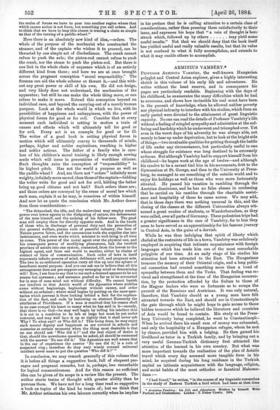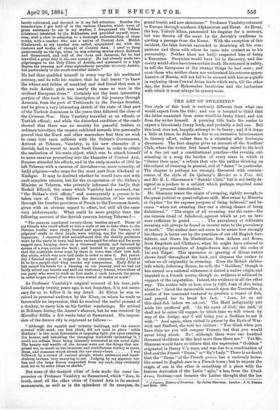ARMINIUS VAMBERY.*
PROFESSOR ARMINIUS VAMBERY, the well-known Hungarian_ polyglot and Central Asian explorer, gives a highly interesting sketch in this volume of his early life and adventures. He writes without the least reserve, and in consequence his pages are particularly readable. Beginning with the days of his childhood, he enumerates the many difficulties which he had to overcome, and shows how invincible his zeal must have been., in the pursuit of knowledge, when he allowed neither poverty nor physical infirmity to interfere with his studies, which from an early period were directed to the attainment of great linguistic capacity. No one can read the details of Professor Vambery's life without a feeling of mingled sympathy and admiration at the suf- fering and hardship which he underwent and triumphed over. Yet even in the worst days of his adversity he was always able, not merely to bear up under deprivation, but to look at the bright side of things,—two invaluable qualities for getting through the battle of life under any circumstances, but particularly useful to one whose struggle for existence was long destined to be extremely arduous. But although Vambery had to support himself from his childhood—he began work at the age of twelve—and although his resolve to be a savant tied him in his movements, first to the- Gymnasium at St. George, and then to the University at Press- burg, he managed to see something of the outside world and to enjoy his holidays as well as those who were more fortunately situated. He passed his vacation in rambling through the. Austrian dominions, and he has no false shame in confessing that he carried on his rambles through the charitable assist- ance and hospitality of those he came across. We may add,. that in those days there was nothing unusual in this, and the closing of the classes at the different Universities always wit- nessed a great exodus of students, or Wanderburschen, as they were called, over all parts of Germany. These pedestrian trips had a greater significance in the case of Vambery, for to him they seem to have served as an apprenticeship for his famous journey- in Central Asia, in the guise of a dervish.
While he was thus indulging that spirit of liberty which, chafed at the restraints of life in a town, Vambery was sedulously employed in acquiring that intimate acquaintance with foreign languages which has made him one of the most remarkable polyglots of our time. At an early stage of his studies his attention had been attracted to the East. The Hungarians treasure the memory of their Oriental crigin, and a long politi- cal connection had created something more than a bond of sympathy between them and the Turks. That feeling was re- vived and strengthened at the time of the Hungarian insurrec- tion, by the protection afforded by the Sultan to those of the Magyar leaders who were so fortunate as to escape the pursuit of the Russians and Austrians. It was only natural, therefore, that Vambery should as a young man have felt• attracted towards the East, and should see in Constantinople the gate through which he might hope to gain access to those hidden treasures which he believed the literature and countries of Asia would be found to contain. His study at the Press- burg University being completed, he went to Constantinople.- When he arrived there his small sum of money was exhausted, and only the hospitality of a Hungarian refugee, whom he met by chance, provided him with a lodging. He then gained his. livelihood as tutor in a Turkish family, and by bringing out a very useful German-Turkish dictionary first attracted the attention of the learned in his own country. But what was more important towards the realisation of the plan of Asiatic travel which every day assumed more tangible form in his mind, he acquired during his long residence in the Turkish capital an intimate acquaintance with the language, religion,. and social habits of the most orthodox or fanatical Mahome- dans :- " I had found," he writes, "in the course of my linguistic researches in the study of Eastern Turkish a field which had been at that time * Arminius Vambiry his Life and Adventures. Written by himself. Witb Portrait and Illustrations. London : T. Fisher Unwin. 1884. barely cultivated, and devoted to it my fall attention. Besides the manuscripts I got hold of in the various libraries, which were of great assistance to me in my studies, I frequented the Tekkes (cloisters) inhabited by the Bokharists, and provided myself, more- over, with a view to attaining to a thorough understanding of these works, with a teacher who was a native of Central Asia. Mollah Khalmurad, as my teacher was called, acquainted me with the customs and modes of thought of Central Asia. I used to hang passionately on his lips' when he was relating stories about Bokhara and Samarcand, and told of the Oxas and Jaxartes, for he had travelled a great deal in his own country. He had already made two pilgrimages to the Holy Cities of Arabia, and possessed to a high degree the cunning and clear.sightedness peculiar to every Asiatic, but particularly to the much-travelled Asiatic."
He had thus qualified himself in every way for his meditated journey, and he tells his readers that he had learnt "to know the whims and foibles of mankind, and had found that man in the rode Asiatic garb was nearly the same as man in the civilised European dress." Certainly not the least interesting portion of this book is his description of his journey through Armenia, from the port of Trebizonde to the Persian frontier, and he gives a very interesting sketch of the state of that part of the Turkish dominions in the years that followed the close of the Crimean War. Here Vambery travelled as an effendi, or Turkish official; and while the disturbed condition of the roads showed that there was no security for peaceful traders or ordinary travellers, the respect exhibited towards him personally proved that the Kurd and other marauders had then no wish to come into open collision with the Sultan's Government.
Arrived at Teheran, Vambery, in his new character of a dervish, had to resort to much fresh finesse in order to obtain the realisation of his main object, which was to attach himself to some caravan proceeding into the khanates of Central Asia.
Success attended his efforts, and in the early months of 1863 he left Teheran with a caravan of dervishes—or, more correctly, of hadji pilgrims—who came for the most part from Khokand or Kashgar. It may be doubted whether he would have met with such complete success, but for the co-operation of the Sultan's Minister at Teheran, who privately informed the hadjis that Reshid Effendi, the name which Vambery had assumed, was "the Sultan's civil officer," and consequently a person to be taken care of. Then follows the description of his travels through the frontier provinces of Persia to the Turcoman desert, given with an obvious regard to effect, but still all the same very picturesquely. What could be more graphic than the following account of the dervish caravan leaving Teheran P-
" The caravan numbered twenty-three, besides myself. Those of my friends who could afford to hire a mule or ass to take them to the Persian border were ready, booted and spurred ; the former, with pilgrims' staffs in their hands, were waiting, too, for the signal of departure. I observed with astonishment that the shabby garments worn by the party in town had been exchanged for other and far more ragged ones, hanging down in a thousand tatters, and fastened by means of a rope across the back ; and learned to my great surprise that the miserable dress worn by them in town was their best holi- day attire, which was now laid aside in order to save it. But yester- day I fancied myself a beggar in my new costume, to-day I looked fit to be a purple-clad king amidst my companions. Hadji Bilal at last raised his hands for a blessing on our journey, and we had not fairly seized our beards and said our customary Amens, when those of our party who were to walk on foot made a rush towards the gates, in order to get ahead of us who were seated on mules or asses."
As Professor Vambery's original account of his tour, pub- lished nearly twenty years ago, is not forgotten, it is not neces- . sary for us to follow it in any detail. At Khiva he was re- ceived in personal audience by the Khan, on whom he made so favourable an impression, that he received the useful present of a donkey, to carry him on his further wanderings. He arrived • at Bokhara during the Ameer's absence, but he was received by Mozaffur Eddin a few weeks later at Samarcand. His impres- sion of the former city is expressed as follows :—
" Although the squalid and rioketty buildings, and the streets covered with sand, one foot thick, did not tend to place noble Bokhara' in the most favourable or imposing light, yet upon entering the bazaar, and beholding the thronging multitude animating it, I could not refrain from being intensely interested at the novel sight. The beauty and wealth of the bazaar were not the things that Bar. prised me, so much as the immense and multifarious variety in races,
dress, and manners which struck the eye everywhere I was followed by a crowd of curious people, whose embraces and hand- shaking became very annoying to me. Judging by my gigantic tur- ban and the large Koran suspended from my neck, they evidently took me to be some Ishan or sheikh."
But none of the decayed cities of Asia made the same im- pression on Professor Vambery as Samarcand, which " does, in truth, excel all the other cities of Central Asia in its ancient monuments, as well as in the splendour of its mosques, its grand tombs, and new structures." Professor Vambery returned to Europe through southern Afghanistan and Herat. At Herat, the boy, Yakoob Khan, penetrated his disguise for a moment, but was thrown off the scent by the dervish's readiness in quoting a passage from the Koran. With the exception of this incident, the false dervish succeeded in deceiving all his com- panions and those with whom he came into contact as to his personality. Neither khan nor hadji suspected him of being a European. Suspicion would have led to discovery, and dis- covery would often have been certain death. He returned in safety, to tell the Europeans of the strange things he had seen ; and even those who neither share nor understand his extreme appre- hension of Russia, will not fail to be amused with him as a guide in exploring those Central Asian lands which were, till the other day, the home of Mahomedan fanaticism and the barbarism with which it must always be synonymous.



































 Previous page
Previous page